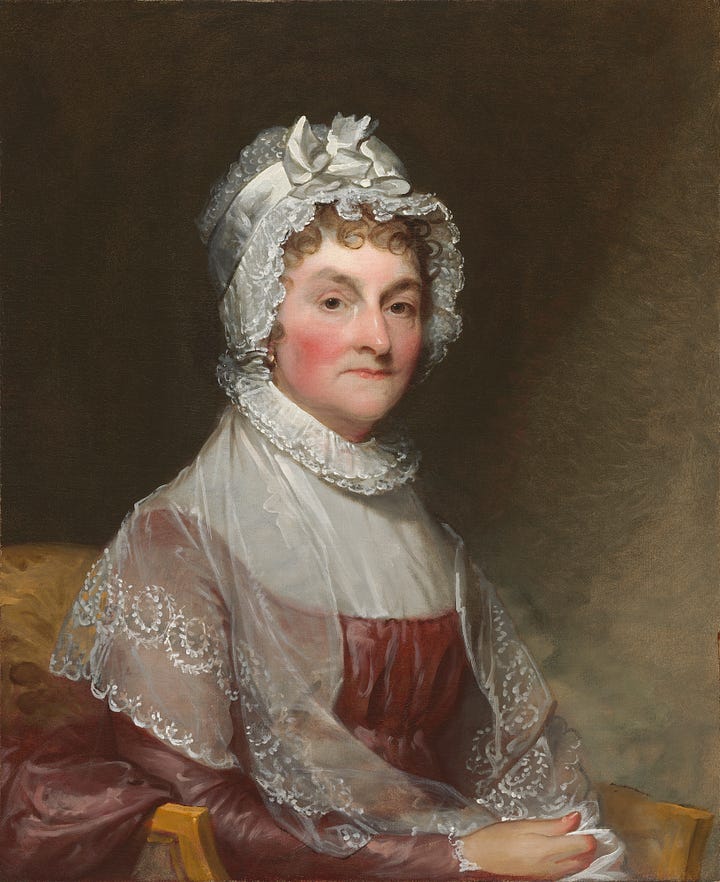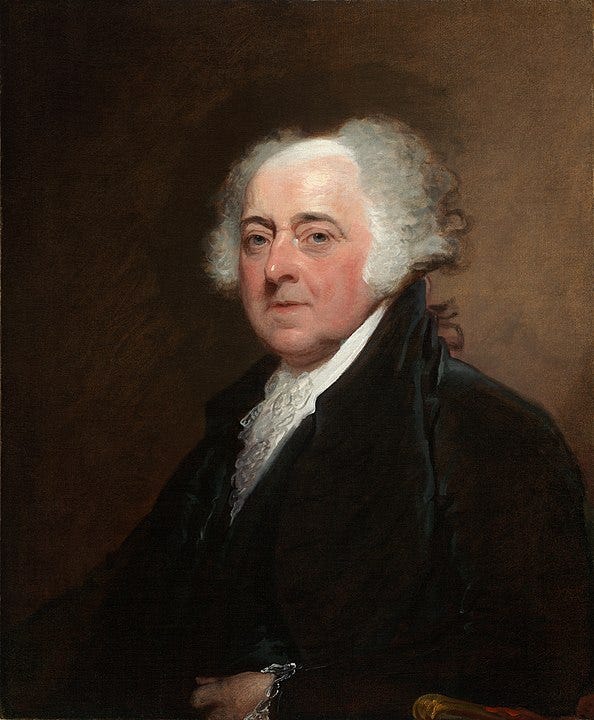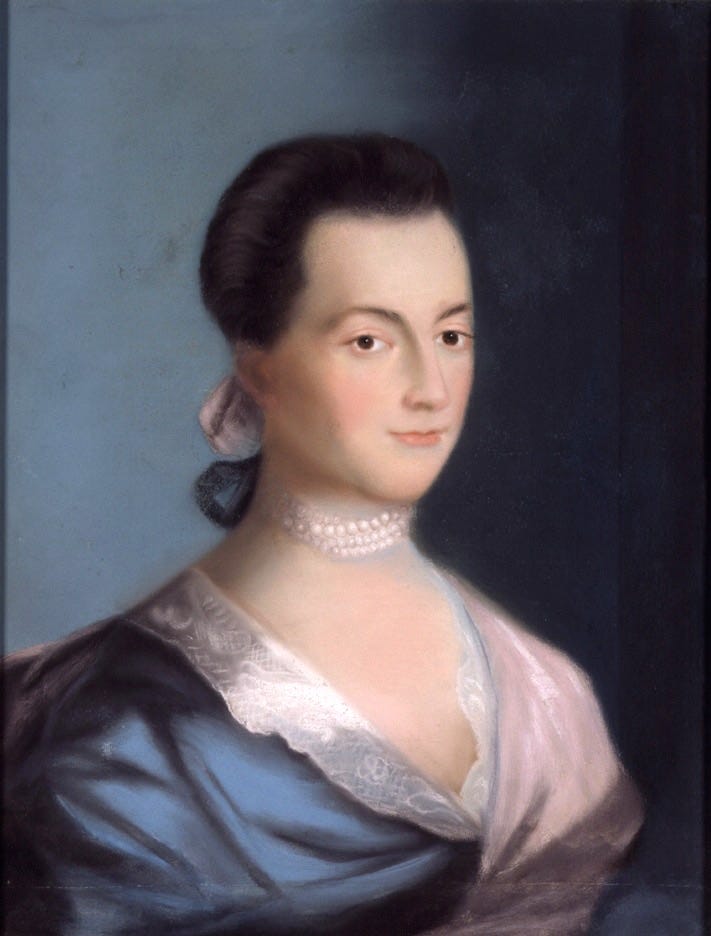On July 27, 1776, John Adams began a letter to his wife, Abigail. They were apart as John worked with the Continental Congress on the formation of what would become the American government.
This is how he opened his letter.
“Disappointed again. -- The Post brought me no Letter from you.”
This style of opening was maybe the most common in their over 1,000 letters. Either Abigail or John lamenting the lack of letters, pining over the distance, and longing for the day they would be reunited.
Here’s a few more examples:
Abigail to John, November 12, 1775:
“I want to hear from you every day, and I always feel sorrow when I come to the close of a Letter.”
Abigail to John, March 31, 1776:
“I wish you would ever write me a Letter half as long as I write you.”
And John’s response on April 14, 1776:
“You justly complain of my short Letters, but the critical State of Things and the Multiplicity of Avocations must plead my Excuse.”


From these and many more letters, a clear picture of genuine love and longing develops. Much of these letters — now famous for reasons we will get into shortly – are filled simple, mundane descriptions of the lovers’ lives.
John describes who he ate dinner with. Abigail talks of being lonely. They worry about the spreading of smallpox. They mourn the loss of friends.
But they also talk about something else. Something they have a better perspective on than most in the colonies.
They talk of revolution.
They discuss fears, predictions, frustrations, and, most often, a hesitant (but growing) hope.
They wonder what the world will look like in the aftermath of their choices. They feel the weight of future generations' judgments.
But, in the end, they believe they are changing the world for the better. They are the starry eyed patriots and revolutionaries we grew up learning about. And in these private letters, more than most anywhere else, we see what a future president thought about the birth of a nation – unfiltered, honest, and ever-evolving.
On July 3, 1776, John Adams believed the world was changed forever. He wrote to Abigail about a turning point in the mindset of the people of the colonies.
“The Hopes of Reconciliation [with Britain], which were fondly entertained by Multitudes of honest and well meaning tho weak and mistaken People, have been gradually and at last totally extinguished.”
Something is different in the colonies. A point of no return has been reached. And the “weak” people who clung to the safety of British rule have quieted (or been silenced).
But beyond the changing opinions of the people, John Adams knows that the day before writing this letter, July 2, 1776, he, along with the rest of the founding fathers, had decided to separate the 13 colonies from the British. They had declared independence.
He wrote to Abigail:
“The Second Day of July 1776, will be the most memorable Epocha, in the History of America.—I am apt to believe that it will be celebrated, by succeeding Generations, as the great anniversary Festival… It ought to be solemnized with Pomp and Parade, with Shews, Games, Sports, Guns, Bells, Bonfires and Illuminations from one End of this Continent to the other from this Time forward forever more.”
Now, the approved version of the Declaration of Independence wasn’t signed until the 4th, the day after Adams wrote this letter, and we now celebrate that day, not the 2nd, each summer.
But the sentiment stands. John Adams knew the grandeur of the thing he was witnessing and participating in. He was seeing history happen before his eyes, uncomfortably aware of the gaze of future generations over his shoulder.
But I want to refocus here. I mentioned before that these letters give us an unfiltered look into the opinions of the men and women who lived during this incredible time in history. That is what this essay is about.
As Leonardo da Vinci wrote in his journal.
“He who has access to the fountain does not go to the water-jar.”
So let’s go to the source and see what one particularly important couple was talking about during the lead up to and early years of the United States of America.
To begin with, we should know that Abigail Adams held the respect of John. John relied on her as a sounding board, a source of insight, a respected intellectual partner. But that didn’t mean they always agreed, or that John didn’t sometimes dismiss Abigail’s opinions. Overall, her opinion mattered to him in a way many husbands at the time didn’t understand, and sometimes mocked.
To begin our journey through their letters, we’ll go to March 31, 1776.
Abigail writes to John about the current state of the conflict, and some losses occurring in the southern colonies. Abigail has a very specific opinion as to why the south is not performing as well as the revolutionaries might hope.
“I have sometimes been ready to think that the passion for Liberty cannot be Eaquelly Strong in the Breasts of those who have been accustomed to deprive their fellow Creatures of theirs. Of this I am certain that it is not founded upon that generous and christian principal of doing to others as we would that others should do unto us.”
To Abigail, the very contradiction between fighting for your own freedom, while actively enslaving thousands, weakens the resolve and leads to lost battles.
The way she presents this argument – by using the rhetoric of the revolution – becomes a common occurrence in Abigail’s writing. She is skilled at taking a person’s words and using them against them.
The most famous way she does this is further down in the same letter where she writes:
“Remember the Ladies, and be more generous and favourable to them than your ancestors. Do not put such unlimited power into the hands of the Husbands. Remember all Men would be tyrants if they could. If perticuliar care and attention is not paid to the Laidies we are determined to foment a Rebelion, and will not hold ourselves bound by any Laws in which we have no voice, or Representation.”
You can see how she uses the language of the revolution against John. How often have they talked in their letter about overthrowing tyrants, gaining freedom, and the importance of liberty? And now Abigail is taking those words and applying them to women. She is turning the tables on John and asking him – if you truly believe in what you are fighting for, if you despise the tyrant, why do you maintain a system of tyranny amongst the sexes?
And that line I bolded, “All men would by tyrants if they could” comes from a Daniel Defoe poem from 1701.
“Nature has left this Tincture in the Blood, That all Men wou’d be Tyrants if they cou’d.”
John Adams had read that poem and used it in an unpublished essay. Abigail is literally using John’s own words against him.
The best part of this is the explicit threat of rebellion if justice is not given to women who have no voice or representation. The driving force of the American Revolution is being turned against one of its founding fathers. If you rebel against your oppressors, why shouldn’t the women rebel against theirs?
Well, for all the respect John may have for Abigail, his response to her is dismissive and cruel.
“As to your extraordinary Code of Laws, I cannot but laugh… This is rather too coarse a Compliment but you are so saucy, I wont blot it out… Depend upon it, we know better than to repeal our masculine systems.”
He laughs her off. He doesn’t even give her the respect of a rebuttal. Only a condescending mockery.
Interestingly, he uses Abigail’s dissatisfaction with the gender status quo to complain about something completely unrelated. He writes.
“We have been told that our Struggle has loosened the bands of Government every where. That Children and Apprentices were disobedient—that schools and Colledges were grown turbulent—that Indians slighted their Guardians and Negroes grew insolent to their Masters. But your Letter was the first Intimation that another Tribe more numerous and powerfull than all the rest were grown discontented.”
He is saying that the revolution against Britain has led to mini revolutions across the colonies. Everyone wanted to push back against the powers above them, and Abigail was just the latest sign of an unsettled population.
It seems John’s opinion is: my resistance is great and honorable, but yours is as petty as a student against a teacher.
It’s belittling and dismissive. And Abigail thinks so too.
On May 7, 1776, Abigail pens a response after a dry spell of writing.
“I can not say that I think you very generous to the Ladies, for whilst you are proclaiming peace and good will to Men, Emancipating all Nations, you insist upon retaining an absolute power over Wives. But you must remember that Arbitary power is like most other things which are very hard, very liable to be broken -- and notwithstanding all your wise Laws and Maxims we have it in our power not only to free ourselves but to subdue our Masters, and without voilence throw both your natural and legal authority at our feet.”
While Adams may have been dismissive in his letters, in other writing we can see him wrestling with this idea of women’s rights, particularly that of the right to vote.
At the time there was a lot of debate around what voting should look like in the new country, particularly the question of who should be allowed to vote. A common solution at the time was that any landowning man could vote. But this idea was beginning to be challenged in a world filled with the rhetoric of equality and independence.
John Adams, on May 26, 1776, wrote a letter to James Sullivan about the topic of voting. Sullivan was considering the idea of opening up the voting to all men, landowning or not.
John has an interesting response. Let’s walk through it.
He starts by taking this idea to its furthest extent. What if everyone could vote?
“But let us first Suppose, that the whole Community of every Age, Rank, Sex, and Condition, has a Right to vote.”
What would happen if this was the case? Majority rule.
“Whence arises the Right of the Majority to govern, and the Obligation of the Minority to obey?”
The minority would be forced to follow the will of the majority, with no power or right to stop it.
John then predicts Sullivan will argue that they shouldn’t give the women the vote (even in this hypothetical). John Adams disagrees.
“But why exclude Women? You will Say, because their Delicacy renders them unfit for Practice and Experience, in the great Business of Life, and the hardy Enterprizes of War, as well as the arduous Cares of State. Besides, their attention is So much engaged with the necessary Nurture of their Children, that Nature has made them fittest for domestic Cares.”
Pretty typical 1700s ideas. Women shouldn’t be able to vote because they are too frail and unfit to make the tough decisions needed to run a country, besides, they are too busy raising kids anyway.
And Adams doesn’t disagree with this, but he still thinks (in this hypothetical) that they should get the vote.
“True. But will not these Reasons apply to others? Is it not equally true, that Men in general in every Society, who are wholly destitute of Property, are also too little acquainted with public Affairs to form a Right Judgment, and too dependent upon other Men to have a Will of their own?”
Ah, there’s the true beliefs of Adams revealed.
This letter correspondence happened just a handful of weeks after Abigail argued with John about women’s rights, and we might be tempted to hope that John took those words to heart and is now arguing to Sullivan that women should get the vote too.
But that’s not the case.
He is saying this: If you want to give the vote to people without property (who are dependent on others and can’t be trusted to act on their own free will because they will just vote as they are told by someone in power) then we may as well give it to women too, who are equally dependent on their husbands and will just vote as their husbands command them to.
This reveals in John not only a distrust of women, but of poor men too.
“Such is the Frailty of the human Heart, that very few Men, who have no Property, have any Judgment of their own. They talk and vote as they are directed by Some Man of Property, who has attached their Minds to his Interest.”
He is not using this hypothetical situation to lift up the cause of women. He is comparing men without property to women as an insult. An insult to their intelligence, their strength of character, and their ability to form their own opinions.
“Generally Speaking, Women and Children, have as good Judgment, and as independent Minds as those Men who are wholly destitute of Property
This is the sexist political equivalent of mocking someone for “throwing like a girl.”
Abigail, if she ever read this letter, would have been livid.
He even uses that lame excuse, so often the weapon of the rhetorically inept, of if we allow this, what next!?
“There will be no End of it. New Claims will arise. Women will demand a Vote. Lads from 12 to 21 will think their Rights not enough attended to, and every Man, who has not a Farthing, will demand an equal Voice with any other in all Acts of State. It tends to confound and destroy all Distinctions, and prostrate all Ranks, to one common Levell.”
We might think that a revolutionary who recently signed a document with the opening lines “We hold these truths to be self-evident, that all men are created equal” would want to “prostrate all ranks to one common level” especially when it comes to voting (representation is the thing that started this whole ordeal in the first place, after all). We might think he would see his hypocrisy. We might think he would listen to Abigail as a true equal.
We would be wrong.








